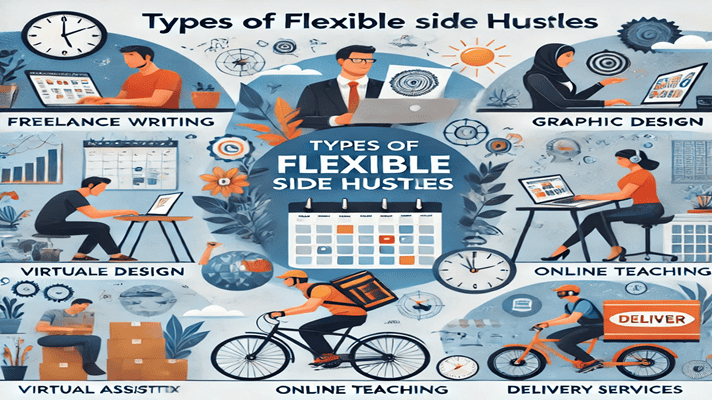Flexible Side Hustles in Retirement: Balancing Income and Lifestyle

Retirement is often seen as a time to relax, pursue hobbies, and enjoy the fruits of decades of hard work. However, for many retirees, it also brings new challenges. Particularly when it comes to managing finances and finding purpose in daily life. This is where flexible side hustles come into play.
They offer a unique solution that bridges the gap between leisure and work, income and lifestyle. These side hustles can be pursued alongside a full-time job, providing extra income options without the commitment of additional traditional work hours.
Why Start a Retirement Side Hustle?

Retirement is a time of newfound freedom, but it can also bring a lot of free time that some retirees may find challenging to fill. Starting a retirement side hustle can be a fantastic way to enhance personal fulfillment and purpose, stay active and engaged, and contribute to society.
Many retirees discover that a side hustle not only provides extra income to supplement their retirement savings but also brings a renewed sense of purpose and excitement to their daily lives.
Part-Time Gigs Enhance Personal Fulfillment and Purpose
A side hustle can be a powerful source of personal fulfillment and purpose, which are crucial for a happy and healthy retirement. By pursuing a passion or interest, retirees can stay engaged and motivated, feeling like they are making a meaningful contribution.
Whether it’s writing, creating art, or volunteering, a side hustle can provide a sense of purpose and fulfillment that is often hard to find in retirement. Imagine turning a lifelong hobby into a small business or sharing your expertise through consulting – the possibilities are endless and deeply rewarding.
Stay Active, Engaged, and Contribute to Society
Staying active and engaged is vital for both physical and mental well-being in retirement. A side hustle can help retirees stay connected with others, learn new skills, and keep up with the latest trends and technologies.
Additionally, a side hustle offers opportunities to contribute to society, whether it’s through volunteering, mentoring, or simply sharing knowledge and experience with others. Engaging in meaningful work can help retirees feel valued and connected to their communities, making retirement a more enriching and enjoyable phase of life.
What Are Flexible Side Hustles?

Flexible side hustles are part-time jobs or small businesses that allow retirees to earn extra income without sacrificing the freedom and flexibility that retirement offers. Unlike a traditional full-time job, these opportunities let you choose when, where, and how much you work.
It’s all about finding the right balance that suits your individual needs and desires. There are numerous hustle ideas that retirees can explore to find the right balance that suits their individual needs and desires.
The Rise of Flexible Work in Retirement
In recent years, there’s been a growing trend of retirees seeking flexible work arrangements. This shift is driven by several factors:
Longer life expectancies mean retirement savings need to stretch further.
Many retirees want to stay active and engaged in their communities.
Advancements in technology have created new opportunities for remote and flexible work.
The gig economy has made it easier for people of all ages to find part-time or temporary work.
Types of Flexible Side Hustles

The world of flexible side hustles is vast and varied, offering something for every interest, skill level, and desired time commitment. Let’s explore some popular options:
Gig Economy Jobs
The gig economy has opened up a world of opportunities for retirees looking for flexible work. These jobs often involve using smartphone apps to connect workers with customers who need specific services.
Examples include:
Ride-sharing services like Uber or Lyft
Food delivery for companies like DoorDash or Grubhub
Task-based work through apps like TaskRabbit
John, a 68-year-old retiree, shares his experience: “I drive for a ride-sharing service a few hours each week. It gets me out of the house, lets me meet interesting people, and the extra cash helps fund my travel hobby.”
Seasonal and Temporary Work
Many businesses need extra help during busy seasons or for special events. These opportunities are perfect for retirees who want to work intensively for short periods and then take time off.
Some options include:
Retail work during the holiday season
Tax preparation assistance in the spring
Summer jobs at parks or tourist attractions
Election poll workers during voting seasons
Mary, 72, found her niche in seasonal work: “I work at a local plant nursery every spring. It’s perfect because I love gardening, and it keeps me busy during the months when I’m most energetic.”
Flexible Remote Work as a Virtual Assistant
The digital age has made it possible to work from anywhere with an internet connection. This is ideal for retirees who want to take on remote work projects for one or more clients, providing flexibility and the ability to manage their time effectively from the comfort of their homes or while traveling.
Popular remote work options include:
Virtual assistant services
Online tutoring or teaching
Customer service representatives
Data entry or transcription work
Sarah, a 65-year-old former teacher, says: “I tutor students online in math and science. It lets me use my teaching skills, set my own hours, and work from anywhere – even when I’m visiting my grandkids!”
Part-Time Jobs with Adjustable Hours
Many local businesses offer part-time positions with flexible scheduling. These jobs can provide a sense of routine and community involvement without the commitment of full-time work.
Examples include:
Bookstore or library assistant
Museum docent or tour guide
Community center receptionist
Golf course starter or ranger
Bob, 70, found his ideal part-time hustle job: “I work at our local library two mornings a week. It keeps me connected to the community, and I love helping people find the perfect book.”
Micro-Entrepreneurship Hustle Ideas
For retirees with an entrepreneurial spirit, starting a small business based on a hobby or skill can be both fulfilling and profitable.
Some ideas to consider:
Selling handmade crafts online or at local markets
Offering pet-sitting or dog-walking services
Providing home organization or decluttering services
Creating and selling digital products like e-books or online courses. Consider using Amazon Kindle Direct Publishing, a cost-effective platform for publishing print-on-demand books without upfront fees.
Linda, a 67-year-old retiree, turned her hobby into a business: “I’ve always loved knitting. Now I sell my handmade scarves and hats online. It’s wonderful to share my creations with others and earn some extra money doing what I love.”
Popular Side Hustles for Retirees
There are countless side hustles that retirees can explore, depending on their interests, skills, and experience. Here are some popular options that have proven to be fulfilling and profitable for many retirees:
Freelance Writing and Editing
Freelance writing and editing can be an excellent side hustle for retirees who enjoy writing and have strong communication skills. With the rise of online platforms, it’s easier than ever to find freelance writing and editing work. Many retirees have found success in this field, whether it’s writing articles, blog posts, or books.
Freelance writing and editing offer a flexible and fulfilling side hustle that allows retirees to work from anywhere and set their own schedules. Plus, it’s a great way to share your knowledge and expertise with a broader audience while earning extra income.
Benefits of Flexible Side Hustles for Retirees

Engaging in flexible work during retirement offers numerous advantages that go beyond just earning extra income:
Supplemental Income
One of the most obvious benefits is the additional money. Even a modest income from a side hustle can make a significant difference in retirement finances. It can help cover unexpected expenses, fund travel plans, or simply provide peace of mind.
Maintaining Active Engagement
Work, even on a part-time basis, keeps the mind sharp and provides a sense of purpose. It offers mental stimulation and can help prevent cognitive decline, a concern for many as they age.
Exploring New Passions
Retirement is an excellent time to explore interests that you may not have had time for during your career. A flexible side hustle can be a low-risk way to turn a hobby into a potential source of income.
Social Connections
Many retirees miss the social interactions that come with working. Flexible jobs can provide opportunities to meet new people, make friends, and stay connected to the community.
Gradual Transition to Retirement
For some, the abrupt shift from a dream job to full retirement can be jarring. Flexible side hustles offer a middle ground, allowing for a more gradual transition into retirement.
Sense of Identity and Self-Worth
Work often forms a significant part of our identity. Continuing to work in some capacity can help maintain a sense of self-worth and personal value.
Finding the Right Flexible Side Hustle

In retirement, the most effective side gigs are those that match your passions, abilities, and preferred way of life. Here’s how to go about it:
Assessing Skills and Interests
Start by making a list of your skills, both from your career and personal life. Then, consider your interests and hobbies. The sweet spot for a side hustle often lies where your skills and interests intersect.
Questions to ask yourself:
What did I enjoy most about my previous work?
What hobbies do I have that could potentially earn money?
What skills have I developed over the years that others might find valuable?
Considering Physical Limitations and Energy Levels
Be honest about your physical capabilities and energy levels. Some jobs might sound appealing but could be too demanding. Look for opportunities that match your current health and stamina.
Evaluating Time Commitment Preferences
Think about how much time you’re willing to dedicate to work. Do you want something that occupies a few hours each day, or would you prefer to work intensively for short periods with long breaks in between?
Matching Opportunities to Retirement Goals
Consider why you want to work in retirement. Is it primarily for extra income, to stay active, or to pursue a passion? Make sure your chosen side hustle aligns with these goals.
Leveraging Technology for Flexible Work

Technology has opened up numerous possibilities for flexible work, especially for retirees. Here’s how you can use it to your advantage:
Digital Platforms for Gig Work
Familiarize yourself with popular gig economy apps and websites. Platforms like Upwork, Fiverr, and TaskRabbit can connect you with people needing your skills or services.
Remote Work Tools and Software
If you’re interested in remote work, get comfortable with tools like Zoom for video conferencing, Slack for team communication, and Google Docs for collaborative work.
Online Marketplaces for Services and Products
Platforms like Etsy, eBay, and Amazon Handmade provide opportunities to sell products through an online store to a global audience. If you’re crafty or have items to sell, these can be great options.
Learning Resources
Take advantage of free online courses to learn new skills or brush up on existing ones. Websites like Coursera, edX, and Khan Academy offer a wide range of classes.
Managing Time and Energy

One of the biggest challenges of working in retirement is maintaining a healthy balance. Here are some strategies to help:
Creating a Sustainable Schedule
Design a work schedule that complements your lifestyle, not dominates it. Be realistic about how much time and energy you can commit without feeling overwhelmed.
Balancing Work with Leisure Activities
Make sure your side hustle doesn’t interfere with the activities and relationships you value in retirement. Schedule work around your priorities, not the other way around.
Avoiding Burnout and Overcommitment
It’s easy to get excited about a new venture and take on too much. Start small and gradually increase your commitments as you find your rhythm.
Setting Boundaries
Be clear with yourself and others about when you’re available for work and when you’re not. It’s okay to say no to opportunities that don’t fit your schedule or goals.
Financial Considerations

Working in retirement can have various financial implications. Here are some key points to consider:
Impact on Retirement Benefits
Earning income after you’ve started receiving Social Security benefits can affect your payments. If you’re under full retirement age and earn above a certain threshold, your benefits might be reduced.
Tax Implications of Additional Income
Additional income may push you into a higher tax bracket or make a larger portion of your Social Security benefits taxable. Consult with a financial advisor or tax professional to understand the implications.
Budgeting and Financial Planning
Treat your side hustle income as a bonus rather than a necessity. Use it to bolster your savings, fund special purchases, or add a layer of financial security.
Record Keeping
Keep good records of your income and expenses related to your side hustle. This will make tax time easier and help you assess whether the venture is financially worthwhile.
Success Stories and Examples

Many retirees have found fulfillment and financial benefits through flexible side hustles. Here are a few inspiring examples:
Tom, 70, a former English teacher, now edits and proofreads manuscripts for self-publishing authors. He works about 15 hours a week from his home office.
Maria, 68, turned her love of dogs into a part-time pet-sitting business. She watches dogs in her home when their owners are on vacation.
David, 73, a retired accountant, prepares tax returns seasonally. He works intensively for a few months each year and travels the rest of the time.
Susan, 66, creates and sells digital scrapbooking templates online. What started as a hobby now provides a steady stream of passive income.
John, 69, partners with suppliers to sell private label products. By customizing existing products with his own branding, he has created a cohesive product line without significant initial investment.
These stories demonstrate the diverse range of opportunities available and how retirees can leverage their skills and interests in new ways.
Conclusion
Flexible side hustles offer retirees a unique opportunity to balance income and lifestyle. They provide a way to stay active, engaged, and financially secure without sacrificing the freedom that retirement brings. Whether it’s turning a hobby into a small business, sharing your expertise through consulting, or trying something completely new, there’s likely a flexible work option that fits your needs and interests.
Remember, the goal is to enhance your retirement, not complicate it. Take time to explore different options, start small, and don’t be afraid to try new things. With the right approach, a flexible side hustle can add richness to your retirement years, providing not just extra income, but also purpose, social connections, and personal growth.
Retirement is a new chapter in life, full of possibilities. A well-chosen flexible side hustle can help you write that chapter exactly the way you want it. Additionally, retirees can leverage social media platforms to promote their side hustles and reach a wider audience.
Frequently Asked Questions (FAQs)
Here are some common questions retirees often have about flexible side hustles:
Will taking on a side hustle affect my Social Security benefits?
Answer: It might. If you’re under full retirement age and earn above a certain amount, your benefits could be reduced. However, these reductions aren’t permanent, and you’ll get the money back in higher future benefits.
2. How many hours should I expect to work in a flexible side hustle?
Answer: It varies widely. You can find opportunities ranging from a few hours a week to 20 or more. The key is to choose a schedule that fits your lifestyle and goals.
3. Do I need special skills or training for a side hustle?
Answer: Not necessarily. While some side hustles require specific skills, many are based on life experience or skills you already have. There are also plenty of opportunities to learn new skills if you’re interested.
4. Can I start a side hustle if I have health issues or limited mobility?
Answer: Absolutely. Many side hustles, especially those based online, can be done from home and adapted to various physical abilities. The key is finding the right fit for your situation.
5. How do I report income from a side hustle on my taxes?
Answer: Generally, you’ll report side hustle income on Schedule C of your tax return. Keep good records of your income and expenses. If you’re unsure, it’s best to consult with a tax professional for guidance.
Disclosure: Some of the links in this article may be affiliate links, which can provide compensation to us at no cost to you if you decide to purchase. This site is not intended to provide financial advice. You can read our affiliate disclosure in our privacy policy.
